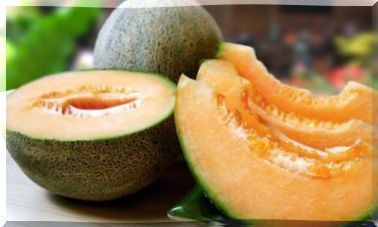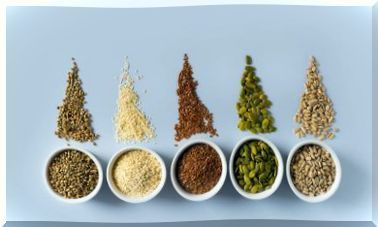Inulin: What Is It, Benefits And Side Effects
Fiber is a major component in most healthy diets. Inulin is one of them. It is made up of a mixture of large and small carbohydrates, among which fructose is the main sugar. That is why it is also known as fructan .
Its ability to absorb water classifies it as a soluble fiber, which provides a minimum caloric value (just 1.5 calories per gram). It complies with special health properties and according to Kaur and Gupta, its behavior against other ingredients broadens its application in the food industry.
Where is this type of fiber found? What are its benefits and what care to take when consuming it? We’ll find out later.
Inulin sources
The ALAN magazine published that more than 36,000 species of plants contain inulin, but only in some foods it is found in sufficient quantities.
Among the plants that produce the most fructans are those of the Liliaceae family , such as garlic, onion, asparagus and garlic, and the Compositae family , in roots and tubers such as chicory, Jerusalem artichoke and yacon. One review shows inulin values in grams per 100 grams of dehydrated food:
- Jerusalem artichoke : 89%.
- Chicory : 79%.
- Dahlia root : 59%.
- Onion : 48%.
- Garlic : 37%.
- Garlic : 29%.
- Yacon : 27%.
- Asparagus : 4%.
- Cambur : 2%.
- Rye : 1%.
Chicory roots are the most common source for extracting inulin and it is found in many regions of the world, from central and northern Europe, China, Africa, South America, and India. Most common foods, such as onion and garlic, contain it in moderate proportion.
Inulin can be ingested naturally or in supplement form, being a fast and effective way of supplying it to the body. However, the dosage has to be recommended by a healthcare professional.
What are the benefits of inulin?
Several benefits of inulin have been studied, not only in health, but also at the food industry level. Let’s review these properties.

Recognized prebiotic
One of the most recognized benefits of inulin is its prebiotic effect. That is, it can be used as a substrate or food to allow the growth of beneficial bacteria at the intestinal level. These bacteria fight disease-causing pathogens.
Macfarland and other experts have shown, through laboratory and human tests, that inulin is capable of promoting the growth of bifidobacteria and lactobacilli, reducing Clostridium .
Vitae magazine reveals the benefits of probiotics. For example, they facilitate the digestion of lactose and protect against diarrhea, irritable bowel and intestinal inflammation. They also prevent urogenital infections and promote the defense barrier of the intestine.
Control blood lipids
The Chilean Medical Journal published a clinical trial on 12 obese patients with high lipids. They were given 7 grams of inulin as a source of fiber per day. After a few months of consumption, it was concluded that inulin managed to lower total cholesterol, LDL cholesterol and triglycerides.
Other human studies have also shown the beneficial effects of inulin on the blood lipid profile. In certain cases only a reduction in triglycerides has been found, while research did not show any effect in obese patients with type 2 diabetes.
Regarding the doses, the evidence indicates that an intake of 6 to 12 grams of inulin daily for 2 or 3 months achieves significant reductions in serum cholesterol. It appears to stimulate the excretion of cholesterol in the stool.
Weight control
Some research links inulin to the modification of the ghrelin hormone signals, linked to appetite. Although the studies reviewed are not enough to affirm this, what is clear is that it increases the satiety of some preparations.
By enhancing the feeling of hunger, caloric intake is reduced. Studies have shown that 1 to 6 kilos can be lost in 12 to 18 weeks by adding inulin powder to the diet. In addition, the accumulation of fat in the liver and muscle tissue is reduced.
Helps regulate blood sugar
Insulin is the hormone that controls blood sugar levels. It carries glucose from the circulation to the muscles and liver, so that it is metabolized within these cells.
In the journal Diabetología it is clarified that inulin, like other soluble fibers, can improve blood sugar levels, since it increases insulin sensitivity and the speed of absorption of sugars by cells.
Improves the absorption of calcium and magnesium
Some researchers found positive effects on the content and density of the bones of laboratory animals that consumed inulin in their diets, since it increased the absorption of calcium.
In adolescent patients , 8 grams of inulin were needed for 8 weeks to observe positive results. In the Journal of Nutrition they point out that inulin also favored the absorption of magnesium.
Fat substitute
In industry, inulin is an excellent binder and gelling agent used to replace fat in light foods . According to the journal Phytochemistry , when long-chain inulin is diluted in water or milk, it forms very small crystals that stick together to achieve a creamy texture.
Sugar substitute
Inulin can be used as a good substitute for sugar, especially short-chain sugar, as it has a sweet taste and similar properties. When 50% sugar is substituted for inulin to make muffins , the taste results are very convincing.
Texture modifier
Inulin modifies the hardness of food, increasing it according to the concentration used. García and other experts, when evaluating a mortadella mixed with inulin, found that the hardness improved when it was used only by 2.5% within the formulation.

What are the side effects of inulin?
The properties of inulin must be maintained by taking care of the amount ingested. When its consumption is above 7 to 10 grams per day it can cause the following:
- Digestive discomfort with a feeling of bloating and fullness.
- Flatulence and accumulation of gases.
Therefore, it is recommended to start with 2 to 3 grams per day in the first 15 days. Then gradually increase between 1 to 2 grams per week until you reach a consumption of 10 grams per day.
People who eat a diet low in short-chain carbohydrates or FODMAPs, such as fructans or oligosaccharides, should avoid inulin.
Remember that it has important benefits, especially in the digestive tract. But it is also crucial not to overdo it by claiming the benefits of soluble fiber, since like any nutrient it has a limit. So you should consult your doctor if you are going to use it as a supplement.









